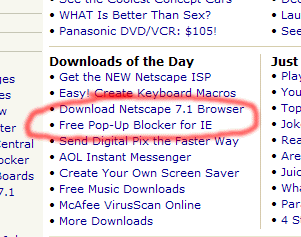It appears initially after the announcement that Yahoo! would start testing a new layout, they only offered it to IE users. Now it appears it’s enabled for Mozilla/Netscape users.
Should note it’s more standards compliant.
It appears initially after the announcement that Yahoo! would start testing a new layout, they only offered it to IE users. Now it appears it’s enabled for Mozilla/Netscape users.
Should note it’s more standards compliant.
Contradicting a few days ago, according to The Channel Insider, Microsoft will be releasing some IE patches for non-XP systems.
…But company officials privately told a select group of developers earlier this year of plans to port some of the IE-specific fixes to the version of IE 6 for Windows 2000 (Service Pack 5 update).
It also told some partners that it was “considering strongly” the idea of making the IE-specific SP2 fixes available for Windows NT, Windows 98, Windows 98 Second Edition and Windows Millennium Edition.
[Source: The Channel Insider | Emphasis mine]
We need to take this, and get working. ASAP. Lets take a quick look at this:
Most companies are still using Windows 2000. The cost of upgrading hundreds, or thousands of workstations is astronomical. Not to mention testing (and potentially upgrading) other internal software to be compatible with it, and possible hardware swaps. Windows 2000 proved pretty stable for companies (that never used a Mac), so they stayed. Why pay for XP, and go through the effort, when there’s no advantage?
Most XP features are already done through third party software, such as Timbuktu. There’s no advantages in XP for them.
So now that there’s no new security updates for Windows 2000, what should a company do?
I think now is the time to make it clear to companies. We need to make this a big priority. IMHO the following would be a good idea:
This effort can double for the education market.
Remember: Many credit Netscape’s success to it being adopted in the office. Then when the office switched to IE, people decided to do the same at home (“the IT guys know what’s best about computers”).
If we want the market, we need to meet the market’s needs. We have a kickass product now. The next step is to show them why our product kicks ass, and how it meets all needs.
A grreat FAQ on XHTML is available, and I encourage all fellow web developers to read up. I found a few interesting things:
First read this:
strong>Why is it allowed to send XHTML 1.0 documents as text/html?
XHTML is an XML format; this means that strictly speaking it should be sent with an XML-related media type (application/xhtml+xml, application/xml, or text/xml). However XHTML 1.0 was carefully designed so that with care it would also work on legacy HTML user agents as well. If you follow some simple guidelines, you can get many XHTML 1.0 documents to work in legacy browsers. However, legacy browsers only understand the media type text/html, so you have to use that media type if you send XHTML 1.0 documents to them. But be well aware, sending XHTML documents to browsers as text/html means that those browsers see the documents as HTML documents, not XHTML documents.
Then read this:
Why is it disallowed to send XHTML 1.1 documents as text/html?
XHTML 1.1 is pure XML, and only intended to be XML. It cannot reliably be sent to legacy browsers. Therefore XHTML 1.1 documents must be sent with an XML-related media type, such as application/xhtml+xml.
Now in the source of that webpage, I see:
but Mozilla says:
Type: text/html
Does anyone taste dogfood? Will the net ever move to towards xml? Not even the W3C feels it’s safe to move.
I don’t think we will ever see websites that say:
Type: application/xhtml+xml
On a sidenote: Does anyone know what versions of Internet Explorer support this trick? Is it 5.0+? Or just 6.0?
It’s just wrong isn’t it?

From Netscape.com approx. 10:30 PM EST
David Bienvenu is working hard on getting Palm Sync working on Thunderbird. The last essential feature before I can move to Thunderbird for mail. Hopefully he learns the Palm Sync code well, and can fix those pesky bugs that have been driving me nuts as well as the new one I filed earlier today. 😉 Awesome to see it getting attention. Looking at the Mozillazine forum (I remember a few other threads as well), it’s a popular feature. I’m sure that others will appreciate the effort just as much.
I adjusted my flash animation on Accettura Media to bypass that new IE “feature” thanks to the whole patent lawsuit over embedded objects. Seems to work fine on all browsers. So goody.
It’s a busy day for me… lots of work in the next 72 hours, so not sure if there will be any more posts for a few.
To the pile of books on my bed….
Microsoft is slowing pushing IE towards the point where it will no longer be available for anything but Longhorn. They announced the other day that there won’t be builds later than 6.0 SP1 for Windows, and the Mac side would not have new releases but would be supported “for the foreseeable future” (we all know what that means).
To me, this is the greatest news yet. Safari and Mozilla provide much better support than IE ever did. They are a far superior choice in browsers. It’s one less rendering agent that a mac webmaster has to support.
They claim that Office will still continue to be developed for the Mac, and there is already a new version in the works. Finally, Microsoft gets the idea, IE for Mac is crap. The Open source movement won as far as quality goes, long ago. What was lost is the PR war. And hopefully as Mac users learn about alternatives, their Windows friends will wake up as well.